高考专题之介词考点梳理
高中英语语法介词归纳总结
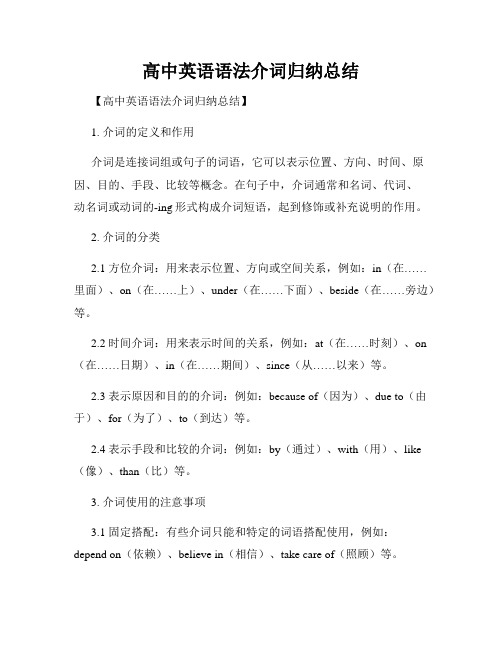
高中英语语法介词归纳总结【高中英语语法介词归纳总结】1. 介词的定义和作用介词是连接词组或句子的词语,它可以表示位置、方向、时间、原因、目的、手段、比较等概念。
在句子中,介词通常和名词、代词、动名词或动词的-ing形式构成介词短语,起到修饰或补充说明的作用。
2. 介词的分类2.1 方位介词:用来表示位置、方向或空间关系,例如:in(在……里面)、on(在……上)、under(在……下面)、beside(在……旁边)等。
2.2 时间介词:用来表示时间的关系,例如:at(在……时刻)、on (在……日期)、in(在……期间)、since(从……以来)等。
2.3 表示原因和目的的介词:例如:because of(因为)、due to(由于)、for(为了)、to(到达)等。
2.4 表示手段和比较的介词:例如:by(通过)、with(用)、like (像)、than(比)等。
3. 介词使用的注意事项3.1 固定搭配:有些介词只能和特定的词语搭配使用,例如:depend on(依赖)、believe in(相信)、take care of(照顾)等。
3.2 介词后的宾语:宾语通常是名词、代词或动名词,而且在形式上要与介词相匹配。
例如:for me(对我来说)、of them(他们的)、with singing(用唱歌的方式)。
3.3 介词短语位置:介词短语通常放在句子中适当的位置,以使句子结构更加清晰和流畅。
例如:The book on the table is mine.(桌子上的书是我的。
)4. 常用介词示例4.1 位置和方向介词:in(在……里面)、at(在……处)、on (在……上)、into(进入)、out of(离开)、off(离开)、up(上升)、down(下降)等。
4.2 时间介词:at(在……时刻)、on(在……日期)、in(在……期间)、since(从……以来)、before(在……之前)等。
高考介词用法总结
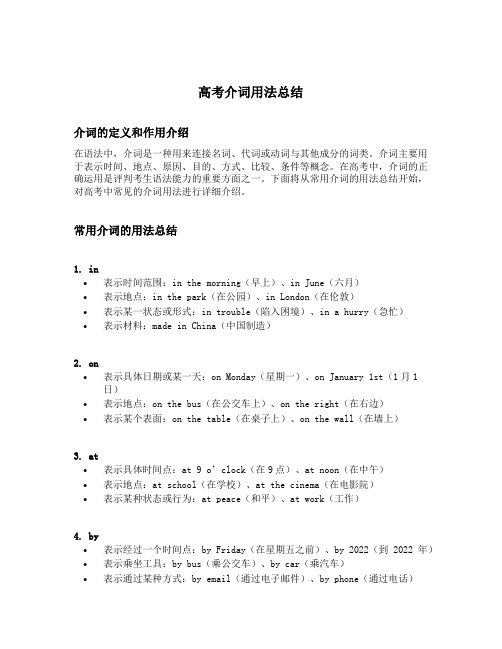
高考介词用法总结介词的定义和作用介绍在语法中,介词是一种用来连接名词、代词或动词与其他成分的词类。
介词主要用于表示时间、地点、原因、目的、方式、比较、条件等概念。
在高考中,介词的正确运用是评判考生语法能力的重要方面之一。
下面将从常用介词的用法总结开始,对高考中常见的介词用法进行详细介绍。
常用介词的用法总结1. in•表示时间范围:in the morning(早上)、in June(六月)•表示地点:in the park(在公园)、in London(在伦敦)•表示某一状态或形式:in trouble(陷入困境)、in a hurry(急忙)•表示材料:made in China(中国制造)2. on•表示具体日期或某一天:on Monday(星期一)、on January 1st(1月1日)•表示地点:on the bus(在公交车上)、on the right(在右边)•表示某个表面:on the table(在桌子上)、on the wall(在墙上)3. at•表示具体时间点:at 9 o’clock(在9点)、at noon(在中午)•表示地点:at school(在学校)、at the cinema(在电影院)•表示某种状态或行为:at peace(和平)、at work(工作)4. by•表示经过一个时间点:by Friday(在星期五之前)、by 2022(到2022年)•表示乘坐工具:by bus(乘公交车)、by car(乘汽车)•表示通过某种方式:by email(通过电子邮件)、by phone(通过电话)5. for•表示目的:study for the exam(为了考试而学习)•表示持续的时间:for two hours(持续两个小时)•表示接受或给予的对象:buy a present for my friend(给我的朋友买个礼物)6. with•表示陪伴:go for a walk with my dog(和我的狗一起散步)•表示具备某种特征或状态:a girl with long hair(一个长发的女孩)•表示伴随的方式或工具:cut with a knife(用刀切)7. to•表示方向:go to school(去学校)•表示某人或物的所有权:a letter to my mother(给我妈妈的信)•表示时间的界限:from Monday to Friday(从星期一到星期五)8. from•表示来源:a gift from my friend(来自我的朋友的礼物)•表示起点或出发地:fly from Beijing to Shanghai(从北京飞往上海)•表示分离:separate the paper from the plastic(把纸和塑料分开)高考常见考点介词总结1. 介词填空•经过时间点:The bus will arrive __ 9 o’clock.•表示目的:I bought a new dress __ the party tonight.•表示地点:He is waiting __ the coffee shop.2. 介词短语选择•他和他的朋友一起去了中国 __ his friend.•这个问题很难,需要你多加注意 __ it.3. 介词错误改正•She is looking forward to see you.•I am good at play the piano.4. 介词填空+短语替换•We need to finish the report __ Thursday. 答案:by高考常见介词错误分析在高考中,介词错误是考生较为容易犯的语法错误之一。
高考语法专题七 介词
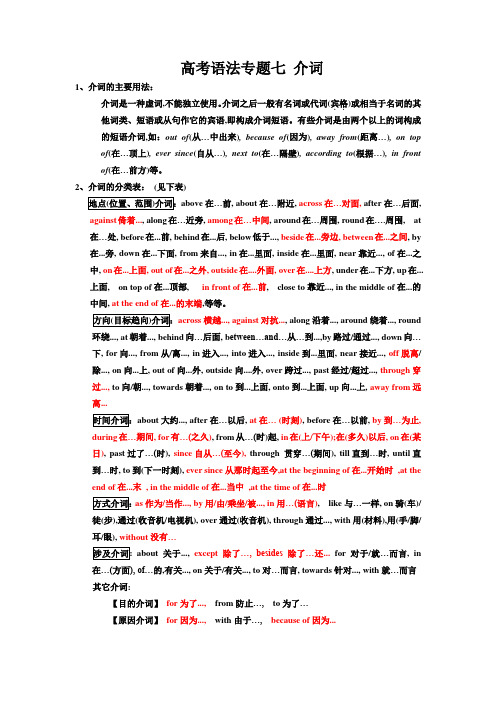
高考语法专题七介词1、介词的主要用法:介词是一种虚词,不能独立使用。
介词之后一般有名词或代词(宾格..)或相当于名词的其他词类、短语或从句作它的宾语,即构成介词短语。
有些介词是由两个以上的词构成的短语介词,如:out of(从…中出来), because of(因为), away from(距离…), on top of(在…顶上), ever since(自从…), next to(在…隔壁), according to(根据…), in front of(在…前方)等。
2、介词的分类表:(见下表)above在…前, about在…附近, across在…对面, after在…后面, against倚着..., along在…近旁, among在…中间, around在…周围, round在….周围, at 在…处, before在...前, behind在...后, below低于..., beside在...旁边, between在...之间, by 在...旁, down在...下面, from来自..., in在...里面, inside在...里面, near靠近..., of在...之中, on在...上面, out of在...之外, outside在....外面, over在....上方, under在...下方, up在...上面, on top of在...顶部, in front of在...前, close to靠近..., in the middle of在...的中间, at the end of在...的末端,等等。
across横越..., against对抗..., along沿着..., around绕着..., round 环绕..., at朝着..., behind向…后面, b etween…and…从…到...,by路过/通过..., down向…下, for向..., from从/离..., in进入..., into进入..., inside到...里面, near接近..., off脱离/除..., on向...上, out of向...外, outside向....外, over跨过..., past经过/超过..., through穿过..., to向/朝..., towards朝着..., on to到...上面, onto到...上面, up向...上, away from远离...about大约..., after在…以后, at在… (时刻), before在…以前, by到…为止, during在…期间, for有…(之久), from从…(时)起, in在(上/下午);在(多久)以后, on在(某日), past过了…(时), since自从…(至今),through 贯穿…(期间), till直到…时, until直到…时, to到(下一时刻), ever since从那时起至今,at the beginning of在...开始时,at the end of在...末, in the middle of在...当中,at the time of在...时as作为/当作..., by用/由/乘坐/被..., in用…(语言), like与…一样, on骑(车)/徒(步),通过(收音机/电视机), over通过(收音机), through通过..., with用(材料),用(手/脚/耳/眼), without没有…about关于..., except除了…, besides除了…还...for对于/就…而言, in 在…(方面), of…的,有关..., on关于/有关..., to对…而言, towards针对..., with就…而言其它介词:【目的介词】for为了...,from防止…,to为了…【原因介词】for因为..., with由于…, because of因为...【比较介词】as与…一样,like象…一样,than比...,to与…相比, unlike与…不同【伴随/状态介词】against和…一起(比赛),at在(上班/休息/上学/家,etc.),in穿着…(衣服/颜色),into变成...,on在(值日), with与…一起,有/带着/长着..., without没有/无/不与…一起3、介词短语的句法作用:介词短语相当于一个形容词或副词,可用作状语、定语和表语。
(英语)高三介词的考点归纳与解题指导
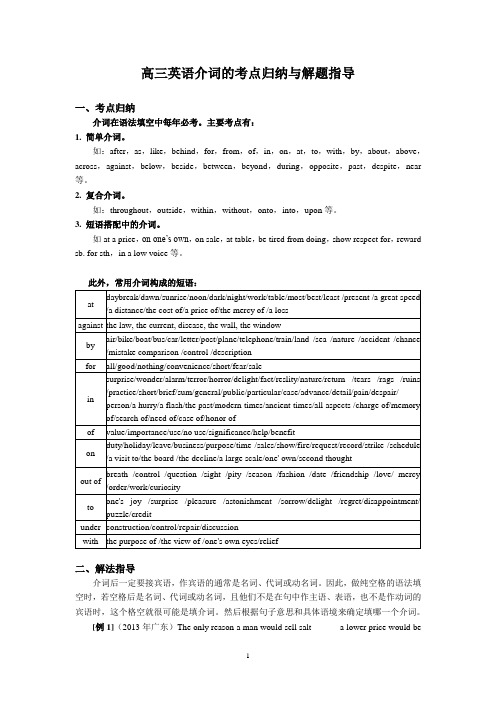
高三英语介词的考点归纳与解题指导一、考点归纳介词在语法填空中每年必考。
主要考点有:1. 简单介词。
如:after,as,like,behind,for,from,of,in,on,at,to,with,by,about,above,across,against,below,beside,between,beyond,during,opposite,past,despite,near 等。
2. 复合介词。
如:throughout,outside,within,without,onto,into,upon等。
3. 短语搭配中的介词。
如at a price,on one’s own,on sale,at table,be tired from doing,show respect for,reward sb. for sth,in a low voice等。
此外,常用介词构成的短语:二、解法指导介词后一定要接宾语,作宾语的通常是名词、代词或动名词。
因此,做纯空格的语法填空时,若空格后是名词、代词或动名词,且他们不是在句中作主语、表语,也不是作动词的宾语时,这个格空就很可能是填介词。
然后根据句子意思和具体语境来确定填哪一个介词。
[例1](2013年广东)The only reason a man would sell salt ______a lower price would bebecause he was desperate for money. And anyone who took advantage of that situation would be showing a lack of respect ______the sweat and struggle of the man who worked very hard to produce it.解析:因名词短语a lower price和the sweat and struggle在句中不作主语、表语或动词的宾语,应是作介词的宾语,空格处应填介词;第一空,根据与price的搭配,填at,at a lower price表示“以更低的价格”;第二空,由show respect for可知,填for。
高考英语语法介词复习知识点总结
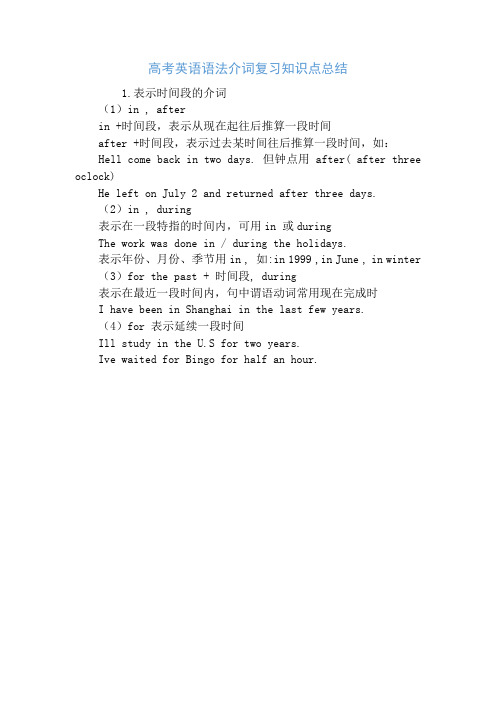
高考英语语法介词复习知识点总结
1.表示时间段的介词
(1)in , after
in +时间段,表示从现在起往后推算一段时间
after +时间段,表示过去某时间往后推算一段时间,如:
Hell come back in two days. 但钟点用after( after three oclock)
He left on July 2 and returned after three days.
(2)in , during
表示在一段特指的时间内,可用in 或during
The work was done in / during the holidays.
表示年份、月份、季节用in , 如:in 1999 ,in June , in winter (3)for the past + 时间段, during
表示在最近一段时间内,句中谓语动词常用现在完成时
I have been in Shanghai in the last few years.
(4)for 表示延续一段时间
Ill study in the U.S for two years.
Ive waited for Bingo for half an hour.。
介词的知识点总结
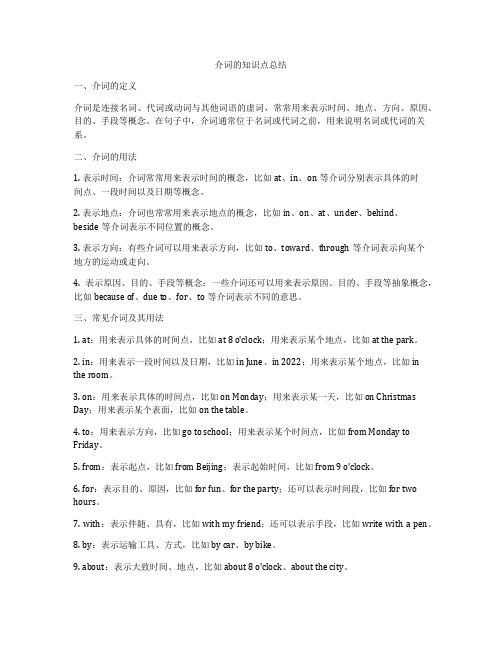
介词的知识点总结一、介词的定义介词是连接名词、代词或动词与其他词语的虚词,常常用来表示时间、地点、方向、原因、目的、手段等概念。
在句子中,介词通常位于名词或代词之前,用来说明名词或代词的关系。
二、介词的用法1. 表示时间:介词常常用来表示时间的概念,比如at、in、on等介词分别表示具体的时间点、一段时间以及日期等概念。
2. 表示地点:介词也常常用来表示地点的概念,比如in、on、at、under、behind、beside等介词表示不同位置的概念。
3. 表示方向:有些介词可以用来表示方向,比如to、toward、through等介词表示向某个地方的运动或走向。
4. 表示原因、目的、手段等概念:一些介词还可以用来表示原因、目的、手段等抽象概念,比如because of、due to、for、to等介词表示不同的意思。
三、常见介词及其用法1. at:用来表示具体的时间点,比如at 8 o'clock;用来表示某个地点,比如at the park。
2. in:用来表示一段时间以及日期,比如in June、in 2022;用来表示某个地点,比如in the room。
3. on:用来表示具体的时间点,比如on Monday;用来表示某一天,比如on Christmas Day;用来表示某个表面,比如on the table。
4. to:用来表示方向,比如go to school;用来表示某个时间点,比如from Monday to Friday。
5. from:表示起点,比如from Beijing;表示起始时间,比如from 9 o'clock。
6. for:表示目的、原因,比如for fun、for the party;还可以表示时间段,比如for two hours。
7. with:表示伴随、具有,比如with my friend;还可以表示手段,比如write with a pen。
高考高中英语核心语法详解 介词
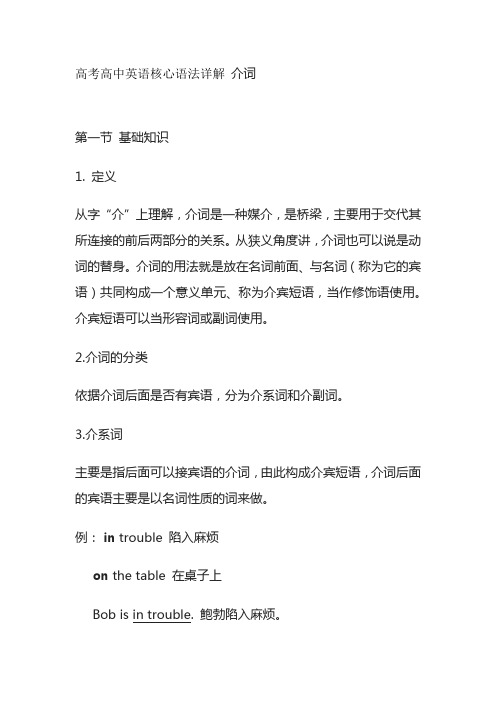
高考高中英语核心语法详解介词第一节基础知识1. 定义从字“介”上理解,介词是一种媒介,是桥梁,主要用于交代其所连接的前后两部分的关系。
从狭义角度讲,介词也可以说是动词的替身。
介词的用法就是放在名词前面、与名词(称为它的宾语)共同构成一个意义单元、称为介宾短语,当作修饰语使用。
介宾短语可以当形容词或副词使用。
2.介词的分类依据介词后面是否有宾语,分为介系词和介副词。
3.介系词主要是指后面可以接宾语的介词,由此构成介宾短语,介词后面的宾语主要是以名词性质的词来做。
例:in trouble 陷入麻烦on the table 在桌子上Bob is in trouble. 鲍勃陷入麻烦。
A red apple is on the table. 一个红苹果放在桌子上了。
4.介副词后面没有宾语,而是直接当副词使用。
Come in. 进来!The soldier stood up. 那名士兵站起来了。
5. 介副词和介词共同使用Mary went down to the basement. 玛丽去了地下室。
down 是介副词,后面没有宾语、直接修饰动词went;to 是介系词,后接名词词组the basement 当宾语、构成一个介词词组to the basement;went 看作不及物动词,后接介词to,再加宾语the basement;He has gone over to your office.over 是介副词,直接修饰动词has gone;to 是介词,后接名词词组your office 当宾语,构成一个介词词组to your office;gone看作不及物动词,后接介词to,再加宾语your office;第二节介系词在短语层面的应用介系词加宾语构成介宾短语后,主要出现在后修饰位置,其作用是交代中心词与其后的宾语之间的关系。
此时介宾短语也可视为形容词的性质。
例:a.2000 entry into the World Trade Organization2000年加入世贸b.an important earner of foreign exchange 赚取外汇的重要来源c. a boom in exports 出口增长第三节介系词在句子层面的应用1. 前状/后状:With the warm weather, the trees grow very well. 天气暖和,树木生长的很好!Kill two birds with one stone. 一石二鸟/一举两得。
高考英语语法填空常考介词
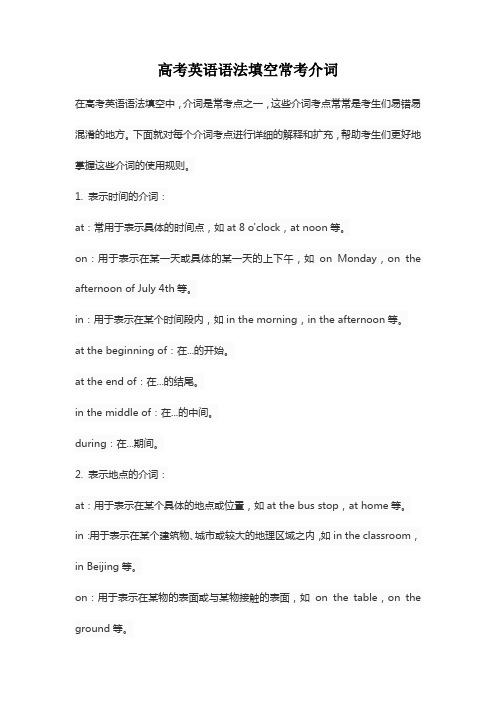
高考英语语法填空常考介词在高考英语语法填空中,介词是常考点之一,这些介词考点常常是考生们易错易混淆的地方。
下面就对每个介词考点进行详细的解释和扩充,帮助考生们更好地掌握这些介词的使用规则。
1. 表示时间的介词:at:常用于表示具体的时间点,如at 8 o'clock,at noon等。
on:用于表示在某一天或具体的某一天的上下午,如on Monday,on the afternoon of July 4th等。
in:用于表示在某个时间段内,如in the morning,in the afternoon等。
at the beginning of:在...的开始。
at the end of:在...的结尾。
in the middle of:在...的中间。
during:在...期间。
2. 表示地点的介词:at:用于表示在某个具体的地点或位置,如at the bus stop,at home等。
in:用于表示在某个建筑物、城市或较大的地理区域之内,如in the classroom,in Beijing等。
on:用于表示在某物的表面或与某物接触的表面,如on the table,on the ground等。
near:在...附近。
by:在...旁边。
between:在...之间。
in front of:在...的前面。
behind:在...的后面。
3. 表示方式的介词:by:用于表示通过某种方式或手段,如by bus,by phone等。
in:用于表示以某种状态或形式存在,如in English,in writing等。
on:用于表示在某种物体或表面上,如on the wall,on the table等。
4. 表示原因的介词:because of:由于...的原因。
due to:由于...的缘故。
这两个介词都可以用来表示原因,但略有区别。
because of更强调直接原因,而due to更强调因果关系。
高中英语高考介词用法总结(基本用法+具体用法)
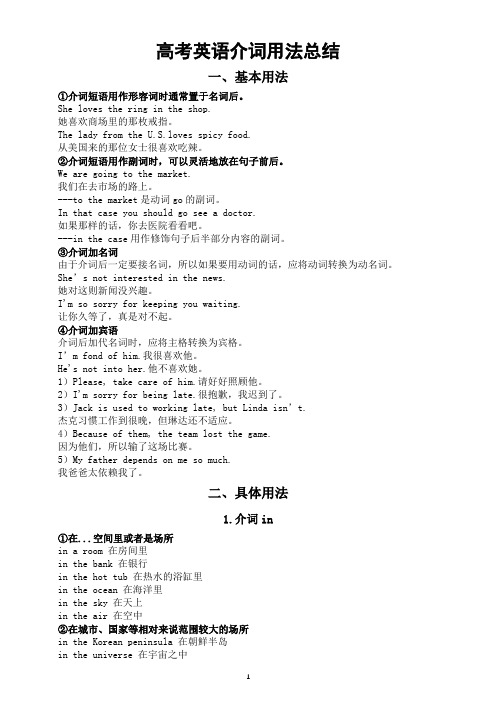
高考英语介词用法总结一、基本用法①介词短语用作形容词时通常置于名词后。
She loves the ring in the shop.她喜欢商场里的那枚戒指。
The lady from the U.S.loves spicy food.从美国来的那位女士很喜欢吃辣。
②介词短语用作副词时,可以灵活地放在句子前后。
We are going to the market.我们在去市场的路上。
---to the market是动词go的副词。
In that case you should go see a doctor.如果那样的话,你去医院看看吧。
---in the case用作修饰句子后半部分内容的副词。
③介词加名词由于介词后一定要接名词,所以如果要用动词的话,应将动词转换为动名词。
She’s not interested in the news.她对这则新闻没兴趣。
I'm so sorry for keeping you waiting.让你久等了,真是对不起。
④介词加宾语介词后加代名词时,应将主格转换为宾格。
I’m fond of him.我很喜欢他。
He's not into her.他不喜欢她。
1)Please, take care of him.请好好照顾他。
2)I'm sorry for being late.很抱歉,我迟到了。
3)Jack is used to working late, but Linda isn’t.杰克习惯工作到很晚,但琳达还不适应。
4)Because of them, the team lost the game.因为他们,所以输了这场比赛。
5)My father depends on me so much.我爸爸太依赖我了。
二、具体用法1.介词in①在...空间里或者是场所in a room 在房间里in the bank 在银行in the hot tub 在热水的浴缸里in the ocean 在海洋里in the sky 在天上in the air 在空中②在城市、国家等相对来说范围较大的场所in the Korean peninsula 在朝鲜半岛in the universe 在宇宙之中in the country 在乡村in the city 在城市里in Seoul 在首尔in Europe 在欧洲③年、月、季节等相对较长的时间in 2002 in the 1980sin March in springin winter in the 20th century④指早上、下午、晚上in the morning 在早上in the afternoon 在下午in the evening 在晚上对比: at noon 中午 at night 晚上⑤表示期间How could you finish he work in 3 days?这件事怎么可能在三天内完成?We can’t get to the island in 5 hours?我们不可能在五个小时之内到那个岛的。
高中英语高考复习介词知识汇总(共四个方面)
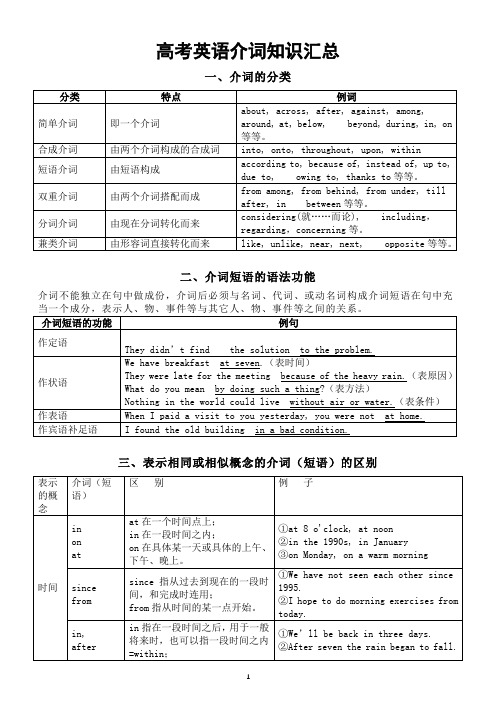
③on Monday, on a warm morning
since
from
since 指从过去到现在的一段时间,和完成时连用;
from指从时间的某一点开始。
①We have not seen each other since 1995.
②I hope to do morning exercises from today.
①The lamp stands in the corner of the room.
②I met with him at the street corner.
③He sat on the corner of the table.
除了
besides
except
but
except for
besides指“除了……还有;except指“除了,减去什么”,不能放在句首。but 与except意思近似,表示“除了…..外”经常用在no, all, nobody, anywhere, everything等和其他疑问词后面。except for表示“除...外,撇开”。
③ He dug a hole in the wall.
in
into
in通常表示位置(静态);
into表示动向,不表示目的地或位置。
①We walked in the park.
②We walked into the park.
through
across
through表示从内部通过,与in 有关;
across则表示从一端至另一端在表面上的通过,与on有关。
under observation 在被观察中
介词连词总结知识点高中
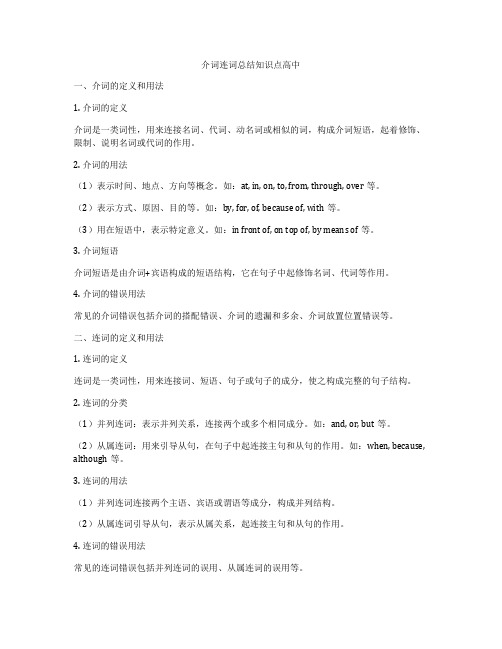
介词连词总结知识点高中一、介词的定义和用法1. 介词的定义介词是一类词性,用来连接名词、代词、动名词或相似的词,构成介词短语,起着修饰、限制、说明名词或代词的作用。
2. 介词的用法(1)表示时间、地点、方向等概念。
如:at, in, on, to, from, through, over等。
(2)表示方式、原因、目的等。
如:by, for, of, because of, with等。
(3)用在短语中,表示特定意义。
如:in front of, on top of, by means of等。
3. 介词短语介词短语是由介词+宾语构成的短语结构,它在句子中起修饰名词、代词等作用。
4. 介词的错误用法常见的介词错误包括介词的搭配错误、介词的遗漏和多余、介词放置位置错误等。
二、连词的定义和用法1. 连词的定义连词是一类词性,用来连接词、短语、句子或句子的成分,使之构成完整的句子结构。
2. 连词的分类(1)并列连词:表示并列关系,连接两个或多个相同成分。
如:and, or, but等。
(2)从属连词:用来引导从句,在句子中起连接主句和从句的作用。
如:when, because, although等。
3. 连词的用法(1)并列连词连接两个主语、宾语或谓语等成分,构成并列结构。
(2)从属连词引导从句,表示从属关系,起连接主句和从句的作用。
4. 连词的错误用法常见的连词错误包括并列连词的误用、从属连词的误用等。
三、介词和连词的练习1. 单词记忆和搭配练习通过记忆常见的介词和连词,掌握它们的用法和搭配。
2. 语境搭配练习通过阅读材料,学习介词和连词的用法,掌握它们在语境中正确的使用方式。
3. 句型转换练习通过对句子中的介词和连词进行转换,加深理解和记忆。
四、介词和连词的应用技巧1. 规律记忆掌握介词和连词的规律和常见搭配,以便运用到实际语境中。
2. 多读多写通过多读多写,积累正确使用介词和连词的经验,提高语言表达能力。
高考英语专题讲解介词
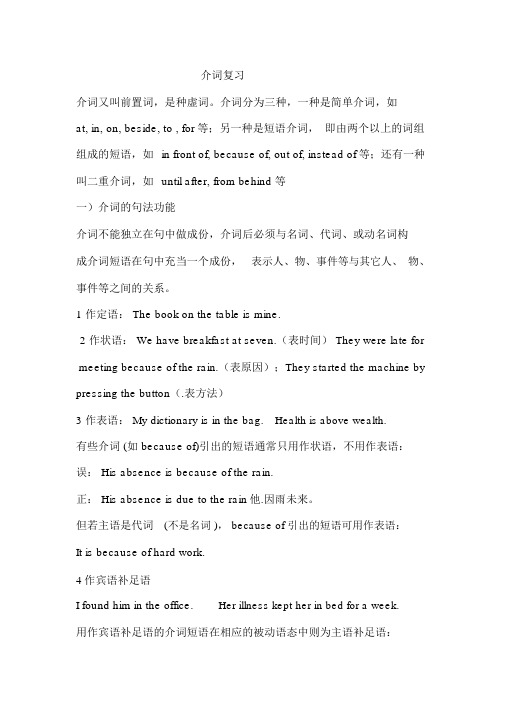
介词复习介词又叫前置词,是种虚词。
介词分为三种,一种是简单介词,如at, in, on, beside, to , for等;另一种是短语介词,即由两个以上的词组组成的短语,如in front of, because of, out of, instead of等;还有一种叫二重介词,如until after, from behind 等一)介词的句法功能介词不能独立在句中做成份,介词后必须与名词、代词、或动名词构成介词短语在句中充当一个成份,表示人、物、事件等与其它人、物、事件等之间的关系。
1 作定语: The book on the table is mine.2 作状语: We have breakfast at seven.(表时间) They were late for meeting because of the rain.(表原因);They started the machine by pressing the button(.表方法)3 作表语: My dictionary is in the bag.Health is above wealth.有些介词 (如 because of)引出的短语通常只用作状语,不用作表语:误: His absence is because of the rain.正: His absence is due to the rain他.因雨未来。
但若主语是代词(不是名词 ), because of 引出的短语可用作表语:It is because of hard work.4作宾语补足语I found him in the office.Her illness kept her in bed for a week.用作宾语补足语的介词短语在相应的被动语态中则为主语补足语:He was regarded as a hero他.被看成是英雄。
5. 用作宾语 A man stepped out from behind the wall.He cannot spare any time except on Sunday除.星期日外他抽不出时间。
高考英语介词知识点汇总

高考英语介词知识点汇总英语中的介词是非常重要的一部分,它用于表示地点、时间、原因、目的、方式等多种关系。
在高考英语中,介词的正确使用是获得高分的关键之一。
下面,我们将汇总一些高考英语常见的介词知识点,以帮助大家更好地掌握这一部分内容。
1. 表示地点的介词(1)In: 表示在某个范围内或地点内。
例如:in the classroom(在教室里)、in London(在伦敦)。
(2)On: 表示在某个表面上或位置上。
例如:on the table(在桌子上)、on the bus(在公交车上)。
(3)At: 表示在某个具体地点或位置上。
例如:at the park(在公园里)、at the door(在门口)。
2. 表示时间的介词(1)In: 表示在某一段时间内。
例如:in the morning(早上)、in May(五月份)。
(2)On: 表示在某个具体的某天或某日期。
例如:on Sunday(星期日)、on June 1st(六月一日)。
(3)At: 表示在具体的某个时刻。
例如:at 2 o'clock(两点钟)、at noon(中午)。
3. 表示原因的介词(1)Because of: 表示由于某个原因。
例如:I couldn't go to the party because of the heavy rain(由于大雨,我不能去参加这个派对)。
(2)Due to: 同样表示由于某个原因。
例如:The game was canceled due to bad weather(由于恶劣天气,比赛被取消了)。
(3)Thanks to: 表示由于某个原因而感谢。
例如:Thanks to my teacher's help, I passed the test(多亏了我的老师的帮助,我通过了这个考试)。
4. 表示目的的介词(1)For: 表示为了某个目的。
例如:I bought a gift for my friend's birthday(我买了一份礼物给我朋友过生日)。
高考英语语法——常用的57个介词大归纳
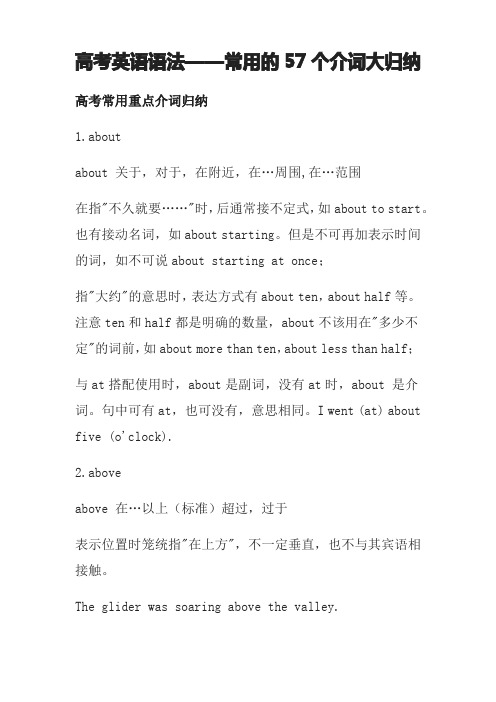
高考英语语法——常用的57个介词大归纳高考常用重点介词归纳1.aboutabout关于,对于,在附近,在…周围,在…范围在指"不久就要……"时,后通常接不定式,如about to start。
也有接动名词,如about starting。
但是不可再加表示时间的词,如不可说about starting at once;指"大约"的意思时,表达方式有about ten,about half等。
注意ten和half都是明确的数量,about不该用在"多少不定"的词前,如about more than ten,about less than half;与at搭配使用时,about是副词,没有at时,about是介词。
句中可有at,也可没有,意思相同。
I went(at)about five (o'clock).2.aboveabove在…以上(标准)超过,过于表示位置时笼统指"在上方",不一定垂直,也不与其宾语相接触。
The glider was soaring above the valley.那架滑翔机在山谷上空滑翔。
Applicants must be above the age of 18.申请者的年龄必须超过18岁。
The temperature has been above the average recently.近来的气温一直比平均温度高。
The sun rose above the horizon.太阳升到地平线上。
The bird is flying low above the water.那只鸟在水面上低飞。
A captain in the navy ranks above a captain in the army.海军的上校军衔高于陆军的上尉军衔。
3.acrossacross交叉,横穿,在…(对面)那边across意为从一头到另一头,处于跨越的位置。
高考英语介词知识点大汇总
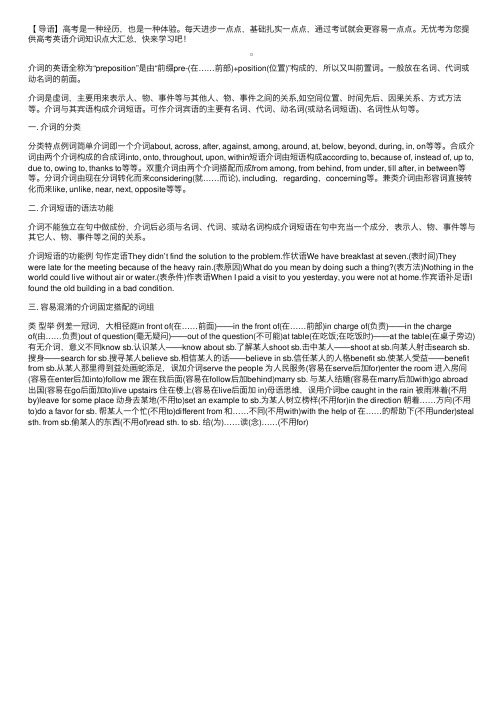
【导语】⾼考是⼀种经历,也是⼀种体验。
每天进步⼀点点,基础扎实⼀点点,通过考试就会更容易⼀点点。
⽆忧考为您提供⾼考英语介词知识点⼤汇总,快来学习吧!介词的英语全称为“preposition”是由“前缀pre-(在……前部)+position(位置)”构成的,所以⼜叫前置词。
⼀般放在名词、代词或动名词的前⾯。
介词是虚词,主要⽤来表⽰⼈、物、事件等与其他⼈、物、事件之间的关系,如空间位置、时间先后、因果关系、⽅式⽅法等。
介词与其宾语构成介词短语。
可作介词宾语的主要有名词、代词、动名词(或动名词短语)、名词性从句等。
⼀. 介词的分类分类特点例词简单介词即⼀个介词about, across, after, against, among, around, at, below, beyond, during, in, on等等。
合成介词由两个介词构成的合成词into, onto, throughout, upon, within短语介词由短语构成according to, because of, instead of, up to, due to, owing to, thanks to等等。
双重介词由两个介词搭配⽽成from among, from behind, from under, till after, in between等等。
分词介词由现在分词转化⽽来considering(就……⽽论), including,regarding,concerning等。
兼类介词由形容词直接转化⽽来like, unlike, near, next, opposite等等。
⼆. 介词短语的语法功能介词不能独⽴在句中做成份,介词后必须与名词、代词、或动名词构成介词短语在句中充当⼀个成分,表⽰⼈、物、事件等与其它⼈、物、事件等之间的关系。
介词短语的功能例句作定语They didn’t find the solution to the problem.作状语We have breakfast at seven.(表时间)They were late for the meeting because of the heavy rain.(表原因)What do you mean by doing such a thing?(表⽅法)Nothing in the world could live without air or water.(表条件)作表语When I paid a visit to you yesterday, you were not at home.作宾语补⾜语I found the old building in a bad condition.三. 容易混淆的介词固定搭配的词组类型举例差⼀冠词,⼤相径庭in front of(在……前⾯)——in the front of(在……前部)in charge of(负责)——in the chargeof(由……负责)out of question(毫⽆疑问)——out of the question(不可能)at table(在吃饭;在吃饭时)——at the table(在桌⼦旁边)有⽆介词,意义不同know sb.认识某⼈——know about sb.了解某⼈shoot sb.击中某⼈——shoot at sb.向某⼈射击search sb.搜⾝——search for sb.搜寻某⼈believe sb.相信某⼈的话——believe in sb.信任某⼈的⼈格benefit sb.使某⼈受益——benefit from sb.从某⼈那⾥得到益处画蛇添⾜,误加介词serve the people 为⼈民服务(容易在serve后加for)enter the room 进⼊房间(容易在enter后加into)follow me 跟在我后⾯(容易在follow后加behind)marry sb. 与某⼈结婚(容易在marry后加with)go abroad 出国(容易在go后⾯加to)live upstairs 住在楼上(容易在live后⾯加 in)母语思维,误⽤介词be caught in the rain 被⾬淋着(不⽤by)leave for some place 动⾝去某地(不⽤to)set an example to sb.为某⼈树⽴榜样(不⽤for)in the direction 朝着……⽅向(不⽤to)do a favor for sb. 帮某⼈⼀个忙(不⽤to)different from 和……不同(不⽤with)with the help of 在……的帮助下(不⽤under)steal sth. from sb.偷某⼈的东西(不⽤of)read sth. to sb. 给(为)……读(念)……(不⽤for)。
介词是高考中的一个重要考点
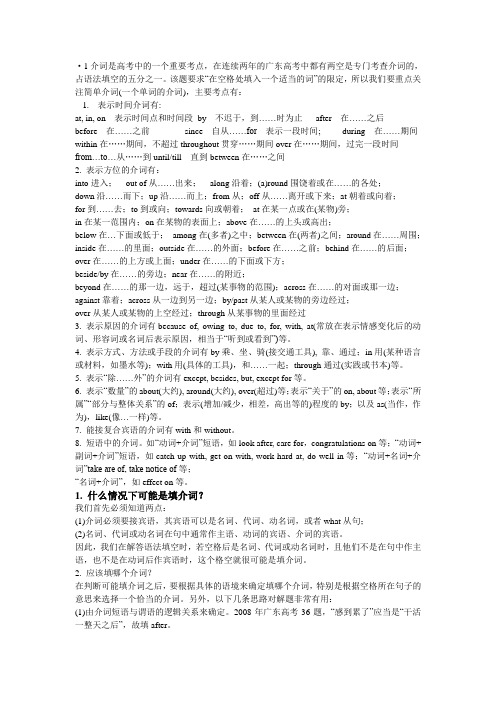
·1介词是高考中的一个重要考点,在连续两年的广东高考中都有两空是专门考查介词的,占语法填空的五分之一。
该题要求“在空格处填入一个适当的词”的限定,所以我们要重点关注简单介词(一个单词的介词),主要考点有:1.表示时间介词有:at, in, on 表示时间点和时间段by 不迟于,到……时为止after 在……之后before 在……之前since 自从……for 表示一段时间; during 在……期间within在……期间,不超过throughout贯穿……期间over在……期间,过完一段时间from…to…从……到until/till直到between在……之间2. 表示方位的介词有:into进入;out of从……出来;along沿着;(a)round围饶着或在……的各处;down沿……而下;up沿……而上;from从;off从……离开或下来;at朝着或向着;for到……去;to到或向;towards向或朝着;at在某一点或在(某物)旁;in在某一范围内;on在某物的表面上;above在……的上头或高出;below在…下面或低于;among在(多者)之中;between在(两者)之间;around在……周围;inside在……的里面;outside在……的外面;before在……之前;behind在……的后面;over在……的上方或上面;under在……的下面或下方;beside/by在……的旁边;near在……的附近;beyond在……的那一边,远于,超过(某事物的范围);across在……的对面或那一边;against靠着;across从一边到另一边;by/past从某人或某物的旁边经过;over从某人或某物的上空经过;through从某事物的里面经过3. 表示原因的介词有because of, owing to, due to, for, with, at(常放在表示情感变化后的动词、形容词或名词后表示原因,相当于“听到或看到”)等。
高中英语语法介词知识点大汇总(直接打印每生一份熟记)
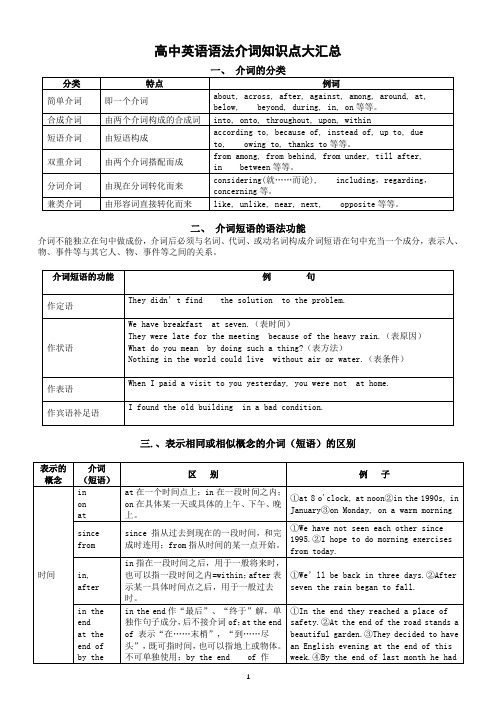
beyond description难以形容
beyond expression无法表达
beyond suspicion 无可怀疑
in+名词或in+名词+of+名词
in the army 在当兵
in need of 需要
in action 在运转
in progress 在进行
in the corneron the cornerat the corner
in the corner 表示在角落里,in指角的内面;on the corner表示“在角上”,on指的不是内面,也不是外面,而含内外兼有之意;at the corner指“在拐角处”,at指的是拐角外附近的外面。
①The lamp stands in the corner of the room.②I met with him at the street corner.③He sat on the corner of the table.
under discussion 在被讨论中
under development 在被发展中
under observation 在被观察中
under test 在被测试
under construction 在被建设中
under fire 在炮火中
under examination 在被检查/调查中
under consideration 在被考虑中
短语介词
由短语构成
according to, because of, instead of, up to, due to, owing to, thanks to等等。
- 1、下载文档前请自行甄别文档内容的完整性,平台不提供额外的编辑、内容补充、找答案等附加服务。
- 2、"仅部分预览"的文档,不可在线预览部分如存在完整性等问题,可反馈申请退款(可完整预览的文档不适用该条件!)。
- 3、如文档侵犯您的权益,请联系客服反馈,我们会尽快为您处理(人工客服工作时间:9:00-18:30)。
高考专题之介词考点梳理一、方位介词1.图解方位介词Be careful. There is a heavy box over your head.小心,你头上方有个很重的箱子。
The sun is above the mountain in the east. 太阳就在东方那座山的上方。
There are some stamps on the desk.桌子上有一些邮票。
The position he pointed to was below the sea level. 他所指的那个位置低于海平面。
The little mouse is under the table,so it is not easy to find it.那只小老鼠在桌子底下,因此很不容易找到它。
The Great Wall winds its way from west to east, across deserts, over mountains, through valleys,till at last it reaches the sea. 长城从西向东越过沙漠,跨过高山,穿过深谷,蜿蜒而行,最后直抵大海。
The crowd of people walked past the City Hall to the Center Square. 一群人经过市政厅走到了中心广场。
It's quite beyond me why such things have been allowed to happen.我难以想象为什么能允许这样的事情发生。
【题组训练】完成句子:①The sunlight came in(穿过)the windows in the roof and lit up the whole room.②The bicycle is(不能)repair.③He hit his head(对着)the wall and hurt himself.①through②beyond③against2. at ,in. on三个词均可和表示地点的词连刖,表示“在⋯⋯处”。
at 用于指较小的地方,如在门牌号码前;in 用于指较大的她方; on 一般指与面或线接触的地方如:We'll meet. each other at the park我们将在公园见面。
Mr. White has lived in Hong Kong for 20 years.怀特先生在香港生活了20 年。
The flood advanced on the village.洪水向村庄冲来。
3. in, on, to 在方位名词前的区别三个词都可表示两地之间的方位关系。
in 表示在某范围之内;to 表示在某范围之外;on 表示“毗邻”、“ 接壤”。
如:Shandong Province is/lies in the east of China.(在某范围之内)山东省在/位于中国东部。
Zhejiang is/lies to the southeast of Hebei Province. (在某范围之外)浙江在 /位于河北省东南边。
Mongolia is/lies on the north of China.(接壤)蒙古在/位于中国北边。
【题组训练】用介词in, to 填空:④ Japan is/lies the east of China.⑤Beijing lies the north of China.④to⑤in4.among, between二词均表示“在⋯⋯中间”或“在⋯⋯之间”。
among 指在三者或三者以上之间,而between 表示在二者之间。
有时 between 之后也可能出现三个或三个以上的宾语,但这时所强调的仍然是其中每两者之间的相互关系。
如:We'll visit the town among the mountains.我们将参观那个群山环绕的镇子。
This secret is only between you and me.这个秘密只限于你我知道。
Near the cemetery between the trees, there is something that shines.在墓地附近,树中间,有闪闪发亮的东西。
He divided his money between John and his nephew.他把他的钱分绐了约翰和他的侄子。
【题组训练】用介词 between, among 填空:⑥The town lies the mountains.⑦Switzerland lies France, Germany, Austria and Italy.⑥among⑦between5. from,out of二同均表示来源或出处。
from 注重起点,意为“从⋯⋯”;out of侧重于从里向外,意为“从⋯⋯ 里出来”。
如:The shouting of the soldiers' drilling could be heard from the playground.人们可以听到从操场上传来的士兵们操练的声音。
She took the passport out of her handbag and showed it to the policeman.她从手提包里拿出了护照让那名警察看了看。
We are moving out of our flat.我们要搬出我们的这所公寓楼。
The train from London arrives here at nine o'clock.从伦敦开来的列车9 点到这里。
【题组训练】用介词 from ,out of 填空:⑧The young student is Tibet.⑨When we were listening to che news,a man rushed the room.⑧from⑨out of6. in ,on二词均可表示“在⋯⋯ 上”,描写两个物体的接触情况。
on 侧重于表面接触,而in 侧重于接触的深度。
英语中的某些习惯表达常用in 或 on。
若打击某人的脸、眼、嘴、胸、腹等部位时,用in。
而打击头、额、鼻、耳、颈、肩、腿等部位时,用on。
表示植物本身生长出来的枝、叶、花、果等“在树上”,用on the tree,但表示植物本身以外的人或动物“在树上”,用 in the tree,意指被枝叶遮掩其中。
如:We found a square hole in the wall.我们发现在墙上有个方洞。
The teacher patted the boy on the head and comforted him.老师轻轻拍着那个男孩子的头并且安慰他。
There are lots of apples on the tree.树上有很多苹果。
【题组训练】用介词in, on 填空:⑩There is a map of the world____the wall.○11 Birds are singing____the tree.⑩on○11in二、时间介词1. at ,in. on(l)at 的用法①表示时间的一点,时刻等,如:at 12: 00, at noon, at night , at midnight ,at dawn, at daybreak②表示较短暂的一段时间,可指某个节日或被认为是一年中标志大事的日子,如:at Christmas(2)in 的用法①表示在某个较长的时间内(如:世纪、朝代、年代、月及泛指上午、下午和傍晚等),如: in the 1980s, in Qing Dynasty , in October,in the morning/afternoon/evening说明:当时间名词前有this, that, last, next, some, ever 等词限定时,通常不用任何介词。
②表示在一段时间之后,如:I'll be back in an hour. 我一小时后回来。
(3) on的用法①用于表示具体的日子或一个特定的时间,如:某日、某节日、星期几等,如:on October the first , onNational Day , on Monday②用于表示特定的上午、下午或晚上,如:on the eve of victory (胜利前夕), on the morning of January thethird , on the afternoon of his arrival.③准时,按时: on time【题组训练】翻译下列词组:○12 在星期天上午○13在三月初○14在儿童节○15 在19世纪20 年代○12 on Sunday mornings○13at the beginning of March○14on Children's Day○15in the 1820s/1820's2. in,afterin 表时间,常表示“在⋯⋯时间之内”,有时in还有“在⋯⋯ 时间之后”的意思,但表示此意时,必须具备两个条件:① 所修饰的动词必须表将来;②后面必须是一段时间。
这两个条件缺一不可,否则用after或later。
after 表时间,意为“在⋯⋯之后”。
通常“after+时间段”与过去时连用;“ after+时间点”与将来时连用。
如:My father will be back in three days.我父亲将在 3 天以后同来。
My father will be back after 3 o'clock.我父亲将在 3 点后回来。
My father came back after 3 days/3 days later.我父亲3天后回来的:【题组训练】用 in, after, later 填空:○ It will be finished an hour.1617○ He returneda few days.they went out to take a walk.○18 They finished their lessons at four and a littlewhile ○16 in○17 after○18 later3. for ,from, sincefor 后接表时间段的名词词组,表示行为或状态持续了多久;from 后接表时间点的名词(词组),表示行为或状态的起始点,而不涉及其持续时间的长短;since 后接表时间点的名词词组,不仅表示行为或状态的起始点,而且还强调该行为或状态从起始点一直持续到此时此刻,因而常与延续性动词的现在完成时连用。
